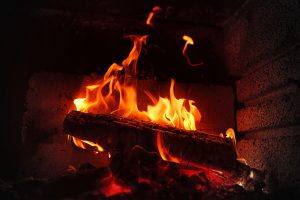If you are building a home or renovating, you may be hoping to add the ambience of a fireplace. This can give you a cozy setting for winter days. Fireplaces are popular among buyers, so having one could increase your property values. While you may be sure about your choice to add a fireplace, you may be more uncertain about whether to add a gas or wood burning fireplace. There are many points to consider in making this choice:
Advantages of a Wood Burning Device
The major advantage of a wood burning device is that it presents the traditional appearance we would envision. The vision of flames dancing over logs is also accompanied by the crackle of wood burning sounds and that rustic smoky smell. Many homeowners enjoy the ambience and effect of a wood burning fireplace. Sitting by a wood burning fire on a cold fall or winter day is really what many people dream of when the word ‘fireplace’ is mentioned.
Disadvantages of a Wood Burning Fireplace
Wood burning fireplaces require wood as fuel obtained either by chopping it yourself or by purchasing it. Wood burning fireplaces require clean-up and maintenance to keep them working safely. Unfortunately, despite their impressive appearance and ambience, wood burning fireplaces are exceptionally inefficient, wasting much of the heat produced through the chimney. Wood burning fireplaces are also not environmentally friendly, contributing to smoke pollution while providing little heat.
Advantages of a Gas Burning Fireplace
A major advantage of gas fireplaces is their ease of use. Starting a fire simply takes the flip of a switch. Cleaning up a gas fireplace is also exceptionally easy, compared to wood burning fireplaces. Gas fireplaces generally require less maintenance than wood burning fireplaces, although it is recommended to have a professional occasionally review it to prevent malfunction. Gas fireplaces produce no smoke, and their construction generally helps to conserve heat and energy in the home.
Disadvantages of a Gas Burning Fireplace
A gas burning fireplace, requires access to a natural gas line. If you do not currently have a natural gas line to your home, it could be difficult and costly to install. Gas fireplaces may give some of the visual appeal of a wood burning fireplace, but they may feel less authentic.
As you can see, gas and wood burning fireplaces each present their own advantages and disadvantages. Overall, wood burning fireplaces give more traditional ambience. However, their environmental side-effects and inefficiency provide a huge drawback. Converting your wood burning device to a wood burning insert or stove provides relatively better efficiency. In contrast, gas fireplaces are easier to use, cleaner, more efficient and they typically require less maintenance. However, gas fireplaces don’t create the traditional sights, sounds, and smells associated with a wood burning device.
Our services at The Irish Sweep can help you decide which option is best for you. They can also help you learn more about the care and maintenance of your new fireplace so you get the greatest efficiency and the best results for your home.

